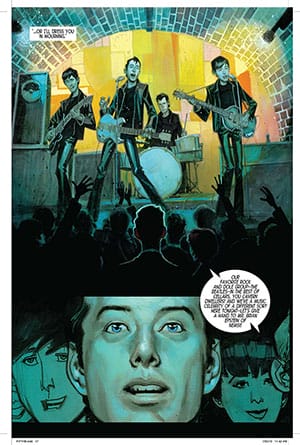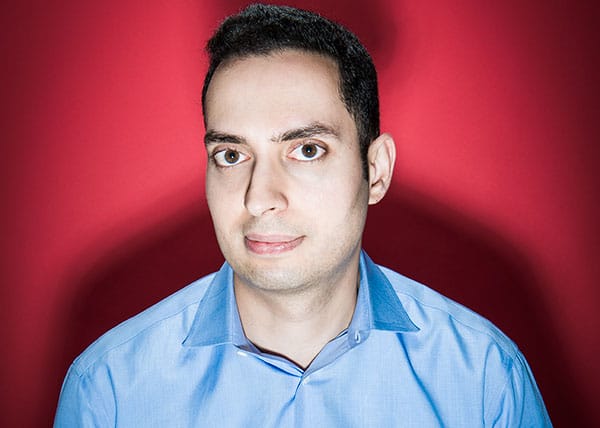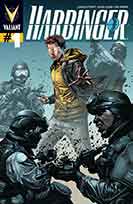The student approached the alumnus after his guest lecture.
The alumnus, an entertainment entrepreneur who went from promoting platinum records in the music industry to producing award-winning, crowd-drawing Broadway musicals, listened as the student asked a complicated and particular question about comic book characters and intellectual property. To this day, the alumnus isn’t exactly sure how he responded, but it must have been the right answer.
The student went on to buy an entire comic book company, then resurrect it beyond its former glory. The alum? He went on to write his own comic book—graphic novel to be exact—about a slightly well-known British band called the Beatles.
The Creative Champion
The alumnus in the story is Vivek J. Tiwary, C’96, W’96, whose latest project, the graphic novel—and soon to be major motion picture—The Fifth Beatle tells Brian Epstein’s story and explores the inspiring and tragic aspects of his largely unknown life. Epstein was the British musical entrepreneur who discovered and managed the Beatles until he passed away in 1967 at the early age of 32. He also became Tiwary’s creative mentor when our hero was a Wharton undergraduate.
As a young adult, Tiwary found inspiration from his maternal grandfather, who had emigrated from India to Guyana as a child. As the grandfather grew older, he became involved with importing and exporting fruits and vegetables, ultimately becoming Guyana’s minister of agriculture. After leaving the government, he opened an Indian spice factory, candy factory, dairy factory, past a factory and a Toyota dealership, and even entered the financial services sector.
“He always told me, ‘You need to do what you love, and you need to work for yourself,’” says the grandson.
Combined with his love for the arts—Tiwary was born and grew up in New York City with immediate access to high culture at the opera, ballet and Broadway, and popular culture at venues like CBGB and the Danceteria—he came to Wharton with the goal of making it in the entertainment industry. There were not many examples of this type of career path discussed in his classes, so Tiwary decided he would seek out role models on his own through personal study.

The cover of the
graphic novel, The
Fifth Beatle
He found his muse in the pages of The Man Who Made the Beatles, a book out of print for decades that Tiwary located through a rare book search at the Strand Book Store in New York. Thus, Tiwary’s research into the life of Brian Epstein began as an academic exercise. With the main published work on his life in hand, Tiwary tracked down every respected book on the Beatles that he could find.
“I would read these 200- to 300-page biographies and there were maybe five or six good pages on Brian,” says Tiwary. “I slowly pieced together the people who knew him best.”
These people were the late Epstein’s former friends and colleagues, like Nat Weiss, the Beatles’ American attorney who introduced Epstein to New York gay culture, and Joanne Peterson, Epstein’s personal assistant until his death. Tiwary cold-called them all. Introducing himself as a business student from the Wharton School, he slowly formed relationships that led his interest in Epstein to take a significant turn.
“It was the business side that I was interested in, but it was the human side of his story that struck a deep chord,” says Tiwary. He learned that Epstein was gay, Jewish and from Liverpool,England, which when placed in historical context, made for a daunting existence. “He was gay at a time when it was literally against the law, Jewish at a time when anti-Semitism was far more prevalent than it is today, and from a town that, prior to the Beatles, had strategic importance as a port town but nothing culturally significant.”
Perhaps more importantly, Tiwary saw a man striving to achieve something he wasn’t expected to be capable of.
“You have a gay Jewish man running around saying that the Beatles are going to be bigger than Elvis,” says Tiwary. “It was crazy. People laughed at him. I felt incredibly inspired by that sense of pursuing a dream that’s outside of what people of your ethnicity are steered toward,” Tiwary explains.

Pages from Tiwary’s work
As an Indian-American, his goals to enter the entertainment industry were relatively uncommon, and he drew motivation from Epstein’s work and viewed him as his “historical mentor.”
In the 21 years that followed Tiwary’s initial undergraduate research, he worked in the recording industry, then founded Tiwary Entertainment Group and found work on Broadway with musicals like Hairspray and The Producers. He went on to lead produce on AmericanIdiot and The Addams Family. While producing A Raisin in the Sun, he came up against naysayers who insisted that African-Americans didn’t have a place on Broadway. Instead, he cast P. Diddy and marketed the show like a hip-hop album with radio ads and flyers at concerts. In breaking down these barriers, Tiwary found himself drawn back to his old friend Epstein. He decided that he wanted to tell Epstein’s story, but did not want to approach the project from the traditional lens.
“I realized that I was more interested in telling the poetry of the Brian Epstein story instead of just recounting the facts,” says Tiwary. This goal led him to choose a graphic novel as his form of communication.
“The graphic novel medium is really exploding right now,” says Tiwary. “It’s no longer considered a comic. This is not a comic story, but it’s told in the comic medium.”
With the help of two artists, Andrew C. Robinson and Kyle Baker, Tiwary released The Fifth Beatle to critical acclaim in 2013. He spent about 10 years on the project in total, with the final four years devoted just to the artwork, which is deeply intricate and evolves throughout to match the tone of Epstein’s life and the Beatles’ music.
Tiwary’s work with Epstein does not end here, however. He thinks of it as a corporate entity that can exist in many forms, be it a graphic novel, film, lectures or interviews. With that grander goal in mind, The Fifth Beatle has been in film development for the past nine years while Tiwary worked on the graphic novel portion. Tiwary is especially proud to have the blessing of Paul McCartney, Ringo Starr and Yoko Ono and to have secured rights to Beatles music for the film. Finance is in progress, and shooting is scheduled to begin in 2015.
Outside of his work on The Fifth Beatle, Tiwary is developing a stage musical based on Alanis Morissette’s Jagged Little Pill and a television series based on the children’s book series Amelia Rules! He is also an advocate for groups like Freedom to Marry, which he highlights at the end of The Fifth Beatle in honor of Epstein’s message of love, transmitted through the music he helped to create.

Jason Kothari, W’07
The Turnaround Artist
Some young people look to comic book characters as a form of escapist entertainment. Others, like Jason Kothari, W’07, see far beyond the ink on the page and envision an unprecedented business opportunity.
Such was Kothari’s mindset in 2005 while he was still an undergraduate student at Wharton, when he purchased down-and-out comic company Valiant’s intellectual property rights with a childhood friend Dinesh Shamdasani.
“I realized that owning a library of popular comic book characters could be analogous in value to owning a stable of A-list actors that can work in perpetuity,” says Kothari.
The recent rise of comic book characters in popular culture makes this point all the more salient. With television shows like The Walking Dead—based on a graphic novel series—drawing 15.7 million viewers for its latest season finale and one successful Marvel Comics movie after another hitting theaters—Captain America: The Winter Soldier has grossed more than $700 million worldwide—the case for comics is stronger than ever. According to Kothari, the global comic book market is valued at upward of $7 billion annually.
Even so, Kothari’s decision to make this purchase was not merely a business calculation— he had been a fan of Valiant comic books since he was a child.
“Like many kids growing up with only a few channels on television, limited access to movies and no Internet, I was an avid comic book reader,” he says. “It was like watching a movie where the director has complete creative autonomy and an unlimited budget.”
Valiant is best known for comics like Harbinger, which follows a group of teenagers with superpowers, and Bloodshot, featuring a former soldier with a wiped memory and regenerative powers on a mission to discover his past. It was founded in 1989 and saw success in the 1990s. After an investment shakeup, Valiant was sold for $65 million to a video game company called Acclaim Entertainment, which rebooted several titles to make the characters more appealing for video game development. This strategy ultimately failed, and Acclaim filed for Chapter 7 bankruptcy in 2004.

A few of Valiant’s resurgent titles
Enter Kothari, who was learning about Chapter 7 bankruptcy in a corporate finance class. Knowing that Acclaim would have to liquidate its assets, he looked into the sale and discovered Valiant’s entire character library at a “bargain basement price”— rumored to be just a couple million dollars. Kothari and his partner turned to friends, family and angel investors for initial financing to pull off this epic deal. Along the way, they brought in leading entertainment investors—the former CEO of Marvel and early investors in Legendary Pictures (of The Dark Knight trilogy fame), to name a few.

With Shamdasani on the creative side and himself leading the business end, Kothari jumped at this unusual opportunity, starting a company that would be known as Valiant Entertainment.
Turning around a struggling comic company may not seem fully compatible with finishing a Wharton undergraduate education, but Kothari says that his entrepreneurial pursuits only led him to focus more in the classroom.

“It allowed me to relate better to the material,” he says. “For example, when we were studying a case about a complex film deal in negotiations class, I hung on to every word as I was actually negotiating an almost identical deal, my first film deal, for Valiant at the same time.”
The purchase was not drama-free. Kothari and his partner had to contend with several legal battles that threatened the acquisition.In particular, the question of who owned the intellectual property rights of a comic book character—creator,artist, comic book company or someone else?—led to great confusion that further complicated the deal.
“We have worked with more law firms than I can remember to protect or enforce our rights and have become very comfortable doing so,” says Kothari.
While designing his business plan for Valiant, Kothari looked to the gold standard of Marvel Comics, which emerged from Chapter 11 bankruptcy in 1999 and was sold to Disney in 2009 for $4.5 billion.
“We borrowed heavily from Marvel at Valiant,” says Kothari, referring not only to the business model, but also to personnel.Marvel’s former CEO is Valiant’s chairman; its former CFO and COO were senior advisers to the company; Marvel’s former head of licensing and promotions is Valiant’s head of licensing and promotions; and one of Marvel’s most acclaimed editors is Valiant’s executive editor. Valiant has also expanded its business plan from a publishing company to a publishing,licensing and film company.
Kothari turned to the Wharton community for support, too,as he decided whether to pursue this opportunity, in particular looking to entrepreneurship instructors like Lawrence Gelburd,WG’91, and other alumni like Jeff Himmel, W’75, who is known for turning around several companies. And unlike Tiwary, Kothari benefited from a Wharton alumni community that had several strong examples of successful careers in the media and entertainment industry. Wharton Entrepreneurship’s Entrepreneur-in-Residence program allowed Kothari to make connections that inspired and encouraged him as he developed Valiant Entertainment.
One of these connections was none other than Tiwary. Tiwary had returned to campus to guest lecture in Gelburd’s entrepreneurship class, and Kothari was the student in our opening story, approaching the entrepreneur to ask about the intellectual property problem he was trying to figure out at the time for Valiant. They bonded over their shared cultural heritage and interest in the comic book industry, and they soon became not just professional colleagues, but close friends.
After hearing Kothari’s plan, Tiwary became an investor and currently sits on Valiant’s board of directors. He even recently finished a script for a short story in Harbinger.
“I often say that Jason is living the businessman’s dream,” Tiwary says. “He bought a company out of bankruptcy that he grew up loving as a child.”
In 2013, Kothari could look at Valiant and be incredibly proud of what he and his team had achieved. The company had been awarded Publisher of the Year, its comics were the third highest selling on average after only Marvel and DC, it had built a consumer products business that was growing rapidly, and there were five major motion pictures in the pipeline in partnership with leading producers, such as the producers of the Fast and the Furious and The Mummy franchises.
“We were fortunate to achieve a cumulative result of a company value increase of 50 times from our acquisition of Valiant out of bankruptcy,” says Kothari.
With the company in such a good state, Kothari decided was time to move on. While still a major shareholder and Valiant’s vice chairman, Kothari has transitioned his full-time work to starting an investment firm called Agordian Holdings. With a successful turnaround of his own on his resume, Kothari’s new firm is focused on distressed media-related acquisitions with the ultimate goal of turning these companies around and building a global media group.
“It’s exciting to be part of a comeback, especially one that involves building teams of extremely talented individuals and reintroducing brands and products people are so passionate about,” says Kothari.

























